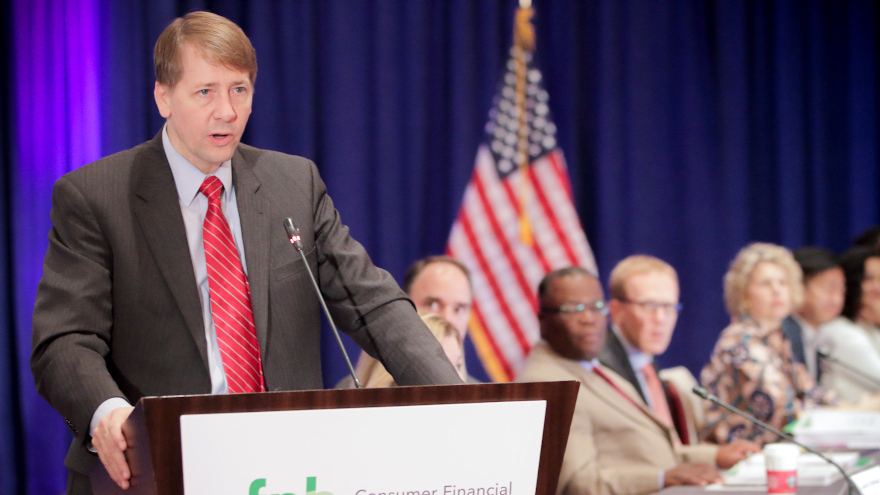Cordray suggests 16 actions CFPB should take, including moratorium on repossessions

Former Consumer Financial Protection Bureau director Richard Cordray speaks during an event in Tampa, Fla., on Nov. 2, 2017. Photo by Reed Kelly / CFPB
By subscribing, you agree to receive communications from Auto Remarketing and our partners in accordance with our Privacy Policy. We may share your information with select partners and sponsors who may contact you about their products and services. You may unsubscribe at any time.
CARY, N.C. –
Richard Cordray, the first director of the Consumer Financial Protection Bureau, posted what he called a white paper containing 16 points of action the CFPB should take during the COVID-19 crisis.
In one of those specific points, Cordray directly addressed repossessions in the composition that resembled a letter or email message to current CPFB director Kathleen Kraninger with courtesy copies specified for the chair and ranking members of the U.S. House Financial Services Committee as well as the U.S. Senate Banking Committee.
When he arrived at point No. 9 that focused on vehicle repossessions, Cordray wrote:
There is an entire industry whose business is repossessing automobiles. Close efforts to police those companies are especially important for those consumers facing possible repossession of their vehicles. In much of the country, this is the only lifeline many families have: to get to work, to secure food, or to be able to access emergency medical care. The CFPB should lead an effort to work with Congress on putting in place a moratorium on auto repossessions for the duration of the crisis and its economic aftermath. It should also take steps to ensure that consumers facing possible repossession of their vehicles are informed, treated fairly, and have the remaining equity in their car or truck fully applied to the balance of their loan.
And joining Cordray in compiling the material was Diane Thompson, former CFPB deputy assistant director of regulations, and Christopher Peterson, former special advisor at the CFPB and Department of Defense.
The post available here also called for more oversight of debt collectors:
Subscribe to Auto Remarketing to stay informed and stay ahead.
By subscribing, you agree to receive communications from Auto Remarketing and our partners in accordance with our Privacy Policy. We may share your information with select partners and sponsors who may contact you about their products and services. You may unsubscribe at any time.
As more indebted consumers begin to face delinquency and default, there will be more scope for harassment and abuses by some debt collectors. This is especially true as borrowers find it more difficult to repay their loans, and debt collectors find it harder to get compensated for debts they are unable to collect. The CFPB and state officials can issue guidance reminding debt collectors that the Fair Debt Collection Practices Act prohibits any conduct “the natural consequence of which is to harass, oppress or abuse any person in connection with the collection of a debt” or any conduct that is “unfair or unconscionable.” The CFPB should issue guidance about what parameters debt collectors should observe in the current crisis to avoid engaging in conduct that is abusive or unconscionable, such as refraining from initiating new debt-collection lawsuits, garnishing wages, or attaching bank accounts. The CFPB must also ensure that contracted debt collectors abide by all the terms newly set by the original lenders for loan modifications or payment forbearance to deal with the crisis.
Cordray closed the 2,700-word message with this suggestion:
There is much important work to do here, and it demands the CFPB’s urgent focus. The economic crisis emerging in this country creates enormous and unavoidable problems and risks for many consumers. It is in difficult times that strong consumer protections are needed the most. The CFPB is well-positioned to make a difference for large numbers of Americans, but it must confront the circumstances and act immediately to mitigate the harmful effects of this crisis. Those with oversight of the CFPB, including the American public, must make sure this happens.


